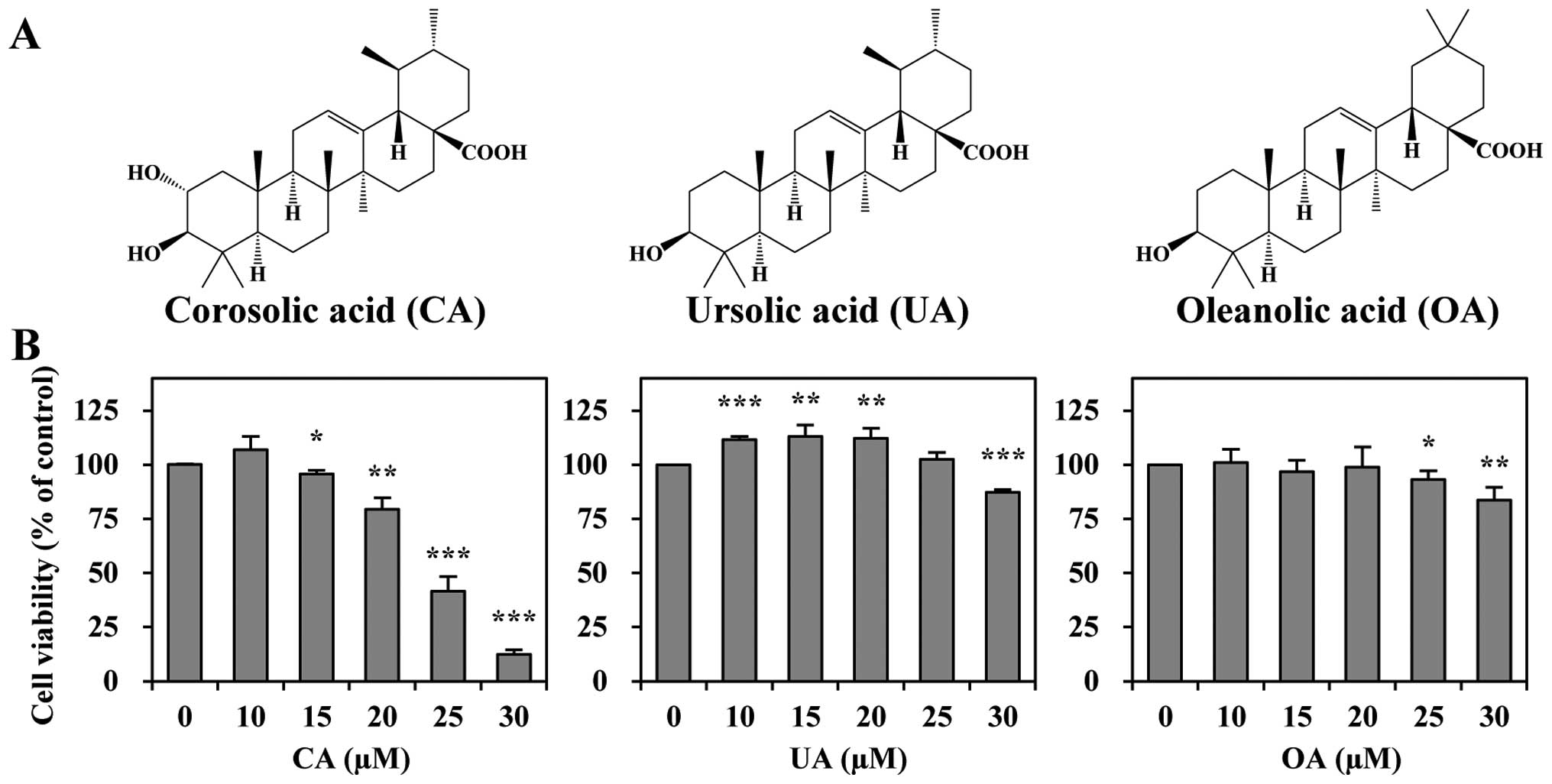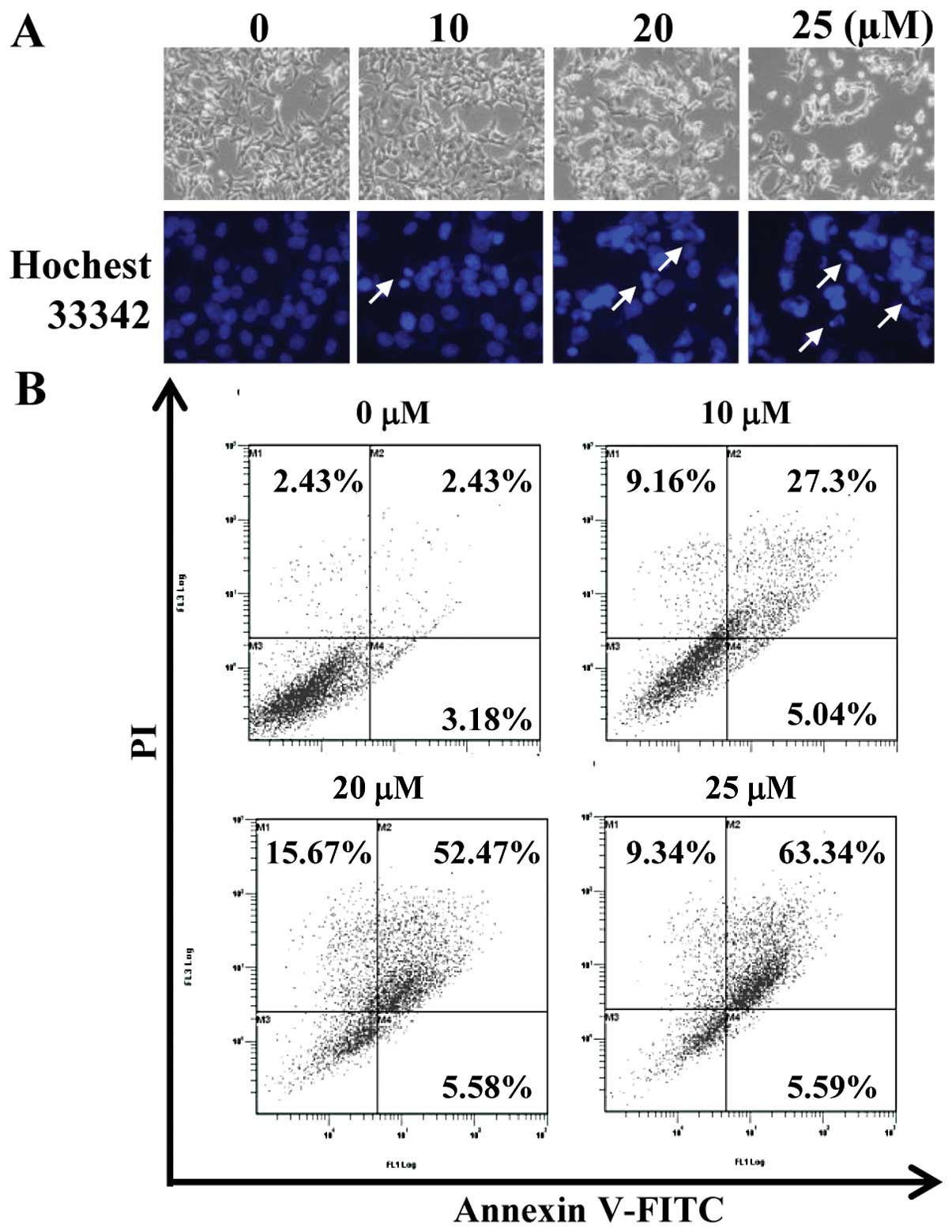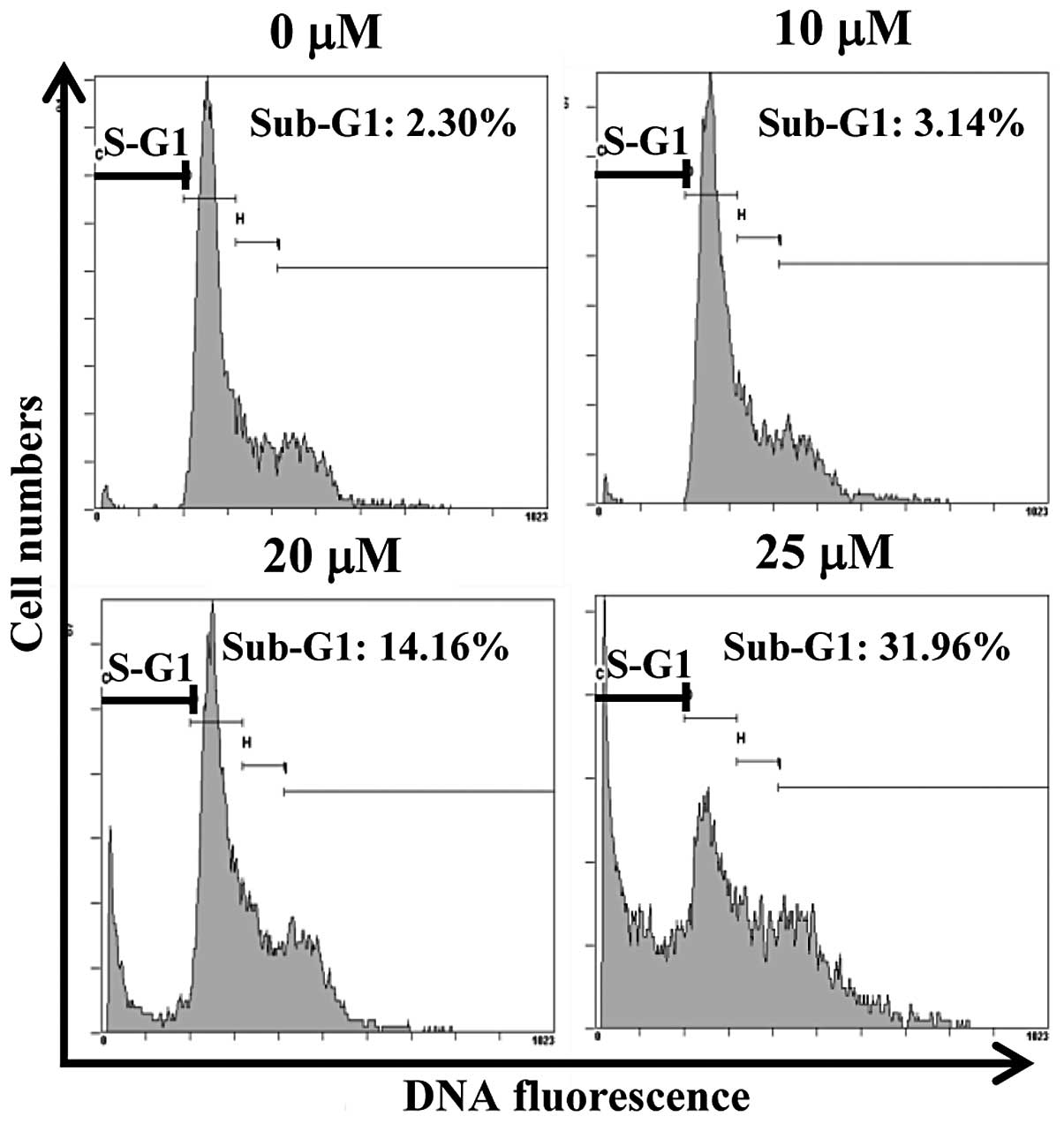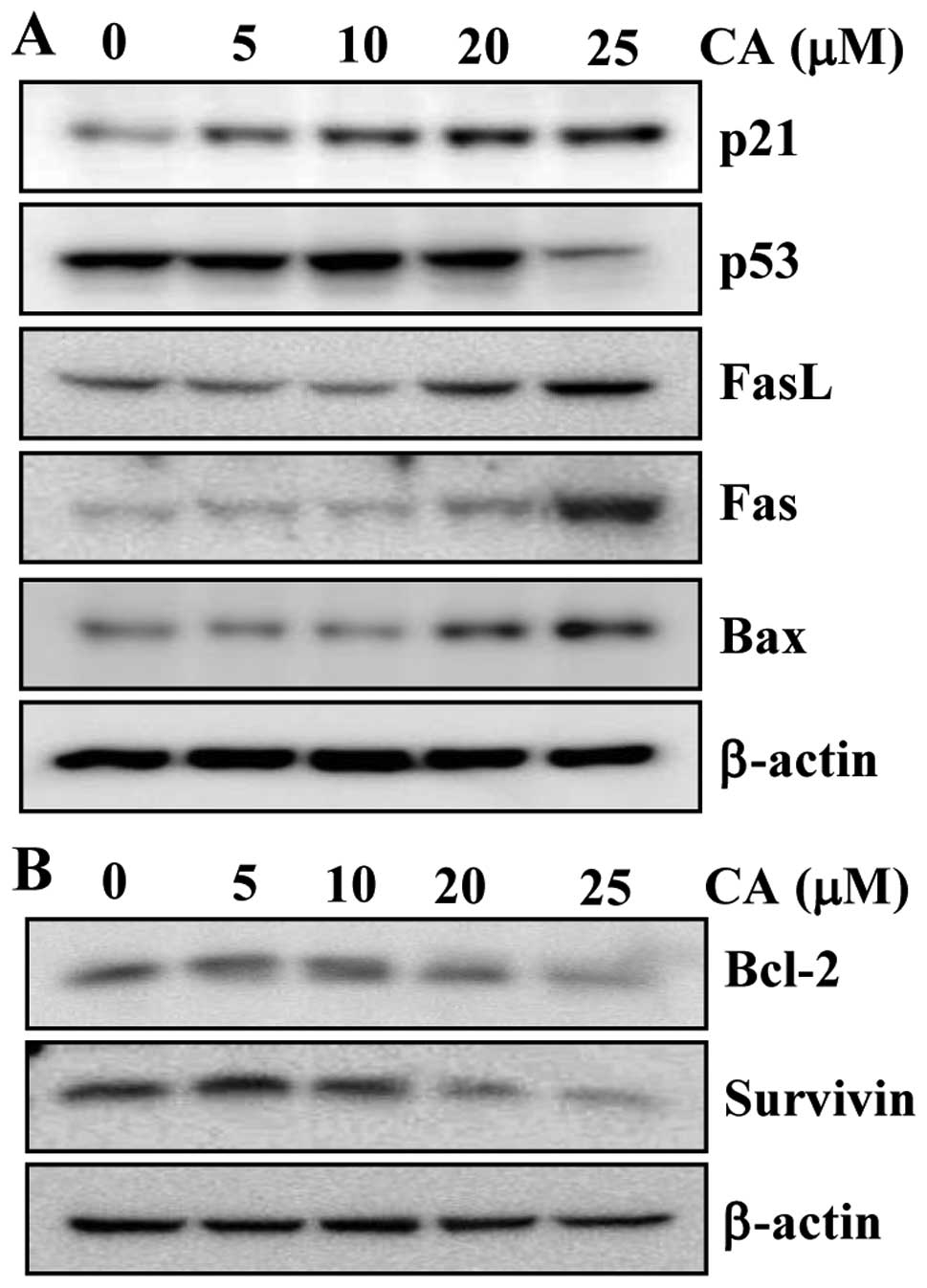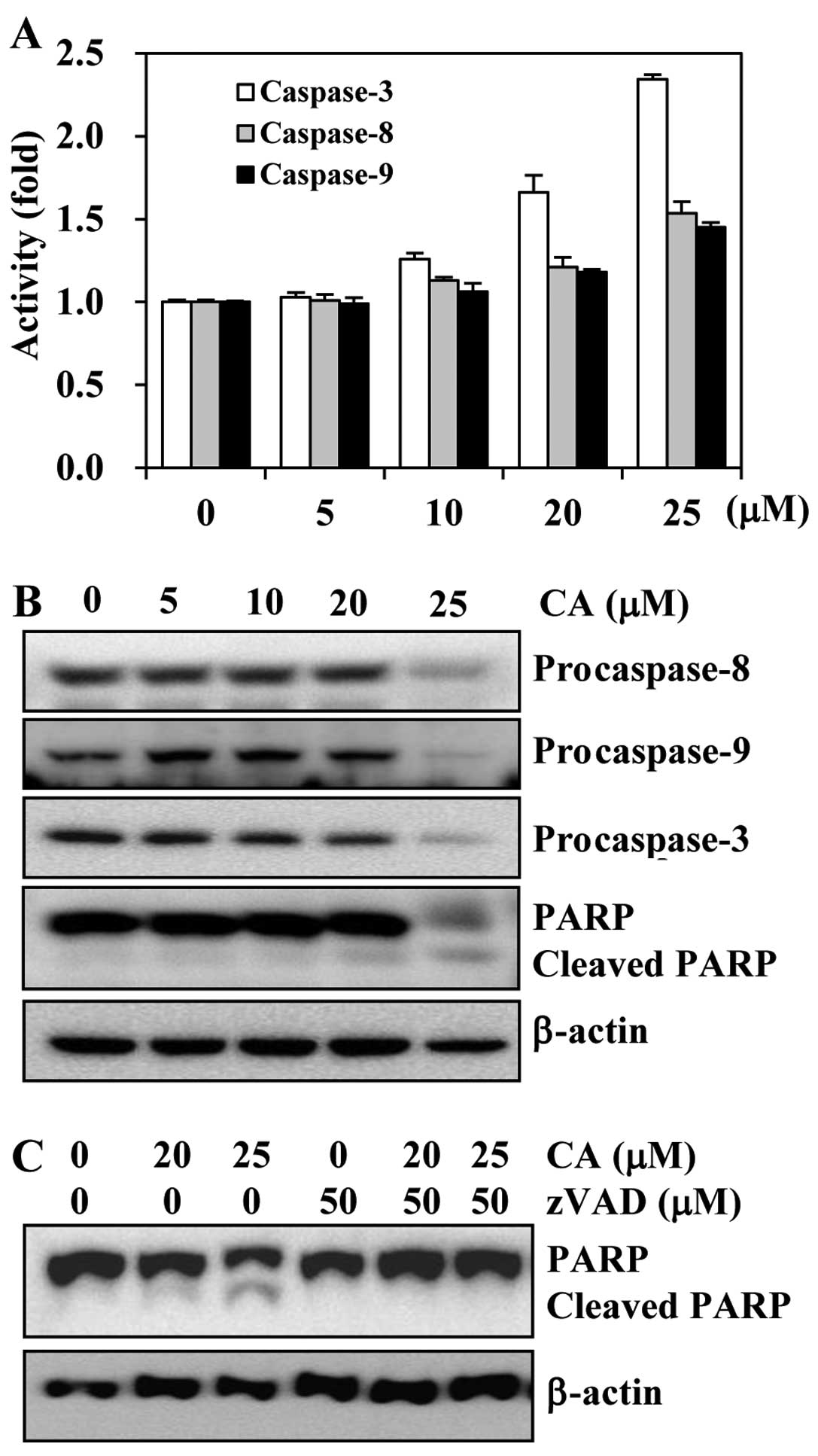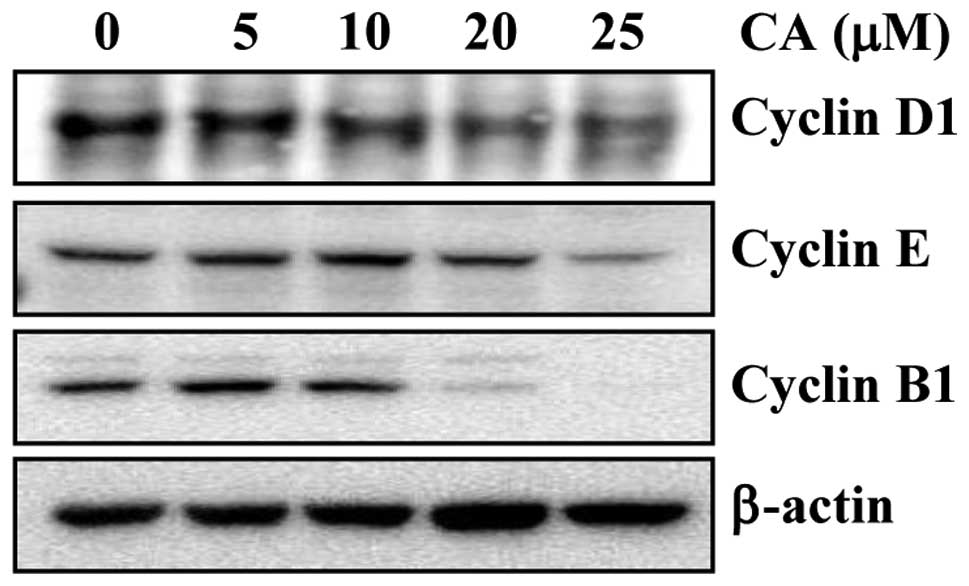|
1
|
Bray F, Jemal A, Grey N, Ferlay J and
Forman D: Global cancer transitions according to the Human
Development Index (2008–2030): a population-based study. Lancet
Oncol. 13:790–801. 2012.PubMed/NCBI
|
|
2
|
Jung KW, Won YJ, Kong HJ, Oh CM, Seo HG
and Lee JS: Cancer statistics in Korea: incidence, mortality,
survival and prevalence in 2010. Cancer Res Treat. 45:1–14. 2013.
View Article : Google Scholar : PubMed/NCBI
|
|
3
|
Kanwar SS, Poolla A and Majumdar AP:
Regulation of colon cancer recurrence and development of
therapeutic strategies. World J Gastrointest Pathophysiol. 3:1–9.
2012. View Article : Google Scholar : PubMed/NCBI
|
|
4
|
Thompson CB: Apoptosis in the pathogenesis
and treatment of disease. Science. 267:1456–1462. 1995. View Article : Google Scholar : PubMed/NCBI
|
|
5
|
Lowe SW and Lin AW: Apoptosis in cancer.
Carcinogenesis. 21:485–495. 2000. View Article : Google Scholar
|
|
6
|
Newman DJ, Cragg GM and Snader KM: Natural
products as sources of new drugs over the period 1981–2002. J Nat
Prod. 66:1022–1037. 2003.PubMed/NCBI
|
|
7
|
Ahn KS, Hahm MS, Park EJ, Lee HK and Kim
IH: Corosolic acid isolated from the fruit of Crataegus
pinnatifida var. psilosa is a protein kinase C inhibitor
as well as a cytotoxic agent. Planta Med. 64:468–470.
1998.PubMed/NCBI
|
|
8
|
Li B, Meng X, Zhu L, Jiao X and Zhang J:
Application of high-speed counter-current chromatography for
isolation of triterpenes from Schisandra chinensis (Turcz.)
Baill and induction apoptosis mechanism of HSC-T6. Biomed Mater
Eng. 24:969–977. 2013.PubMed/NCBI
|
|
9
|
Uto T, Sakamoto A, Tung NH, et al:
Anti-proliferative activities and apoptosis induction by
triterpenes derived from Eriobotrya japonica in human
leukemia cell lines. Int J Mol Sci. 14:4106–4120. 2013. View Article : Google Scholar : PubMed/NCBI
|
|
10
|
Miura T, Takagi S and Ishida T: Management
of diabetes and its complications with banaba (Lagerstroemia
speciosa L.) and corosolic acid. Evid Based Complement Alternat
Med. 2012:8714952012.PubMed/NCBI
|
|
11
|
Caligiani A, Malavasi G, Palla G,
Marseglia A, Tognolini M and Bruni R: A simple GC-MS method for the
screening of betulinic, corosolic, maslinic, oleanolic and ursolic
acid contents in commercial botanicals used as food supplement
ingredients. Food Chem. 136:735–741. 2013. View Article : Google Scholar : PubMed/NCBI
|
|
12
|
Lee MS, Lee CM, Cha EY, et al: Activation
of AMP-activated protein kinase on human gastric cancer cells by
apoptosis induced by corosolic acid isolated from Weigela
subsessilis. Phytother Res. 24:1857–1861. 2010. View Article : Google Scholar : PubMed/NCBI
|
|
13
|
Rao AR, Veeresham C and Asres K: In vitro
and in vivo inhibitory activities of four Indian medicinal plant
extracts and their major components on rat aldose reductase and
generation of advanced glycation endproducts. Phytother Res.
27:753–760. 2013. View
Article : Google Scholar
|
|
14
|
Yin MC, Lin MC, Mong MC and Lin CY:
Bioavailability, distribution, and antioxidative effects of
selected triterpenes in mice. J Agric Food Chem. 60:7697–7701.
2012. View Article : Google Scholar : PubMed/NCBI
|
|
15
|
Chen H, Yang J, Zhang Q, Chen LH and Wang
Q: Corosolic acid ameliorates atherosclerosis in apolipoprotein
E-deficient mice by regulating the nuclear factor-κB signaling
pathway and inhibiting monocyte chemoattractant protein-1
expression. Circ J. 76:995–1003. 2012.PubMed/NCBI
|
|
16
|
Takagi S, Miura T, Ishihara E, Ishida T
and Chinzei Y: Effect of corosolic acid on dietary
hypercholesterolemia and hepatic steatosis in KK-Ay diabetic mice.
Biomed Res. 31:213–218. 2010. View Article : Google Scholar : PubMed/NCBI
|
|
17
|
Klein G, Kim J, Himmeldirk K, Cao Y and
Chen X: Antidiabetes and anti-obesity activity of Lagerstroemia
speciosa. Evid Based Complement Alternat Med. 4:401–407. 2007.
View Article : Google Scholar
|
|
18
|
Aguirre MC, Delporte C, Backhouse N, et
al: Topical anti-inflammatory activity of 2alpha-hydroxy
pentacyclic triterpene acids from the leaves of Ugni molinae.
Bioorg Med Chem. 14:5673–5677. 2006. View Article : Google Scholar : PubMed/NCBI
|
|
19
|
Nho KJ, Chun JM and Kim HK: Corosolic acid
induces apoptotic cell death in human lung adenocarcinoma A549
cells in vitro. Food Chem Toxicol. 56:8–17. 2013. View Article : Google Scholar : PubMed/NCBI
|
|
20
|
Horlad H, Fujiwara Y, Takemura K, et al:
Corosolic acid impairs tumor development and lung metastasis by
inhibiting the immunosuppressive activity of myeloid-derived
suppressor cells. Mol Nutr Food Res. 57:1046–1054. 2013. View Article : Google Scholar : PubMed/NCBI
|
|
21
|
Cai X, Zhang H, Tong D, et al: Corosolic
acid triggers mitochondria and caspase-dependent apoptotic cell
death in osteosarcoma MG-63 cells. Phytother Res. Feb 21–2011.(Epub
ahead of print).
|
|
22
|
Fujiwara Y, Komohara Y, Ikeda T and Takeya
M: Corosolic acid inhibits glioblastoma cell proliferation by
suppressing the activation of signal transducer and activator of
transcription-3 and nuclear factor-kappa B in tumor cells and
tumor-associated macrophages. Cancer Sci. 102:206–211. 2011.
View Article : Google Scholar
|
|
23
|
Xu Y, Ge R, Du J, et al: Corosolic acid
induces apoptosis through mitochondrial pathway and caspase
activation in human cervix adenocarcinoma HeLa cells. Cancer Lett.
284:229–237. 2009. View Article : Google Scholar : PubMed/NCBI
|
|
24
|
Lee MS, Cha EY, Thuong PT, Kim JY, Ahn MS
and Sul JY: Down-regulation of human epidermal growth factor
receptor 2/neu oncogene by corosolic acid induces cell cycle arrest
and apoptosis in NCI-N87 human gastric cancer cells. Biol Pharm
Bull. 33:931–937. 2010. View Article : Google Scholar : PubMed/NCBI
|
|
25
|
Miura T, Itoh Y, Kaneko T, et al:
Corosolic acid induces GLUT4 translocation in genetically type 2
diabetic mice. Biol Pharm Bull. 27:1103–1105. 2004. View Article : Google Scholar : PubMed/NCBI
|
|
26
|
Wen X, Xia J, Cheng K, et al: Pentacyclic
triterpenes. Part 5: synthesis and SAR study of corosolic acid
derivatives as inhibitors of glycogen phosphorylases. Bioorg Med
Chem Lett. 17:5777–5782. 2007. View Article : Google Scholar : PubMed/NCBI
|
|
27
|
Shi L, Zhang W, Zhou YY, et al: Corosolic
acid stimulates glucose uptake via enhancing insulin receptor
phosphorylation. Eur J Pharmacol. 584:21–29. 2008. View Article : Google Scholar : PubMed/NCBI
|
|
28
|
Vermeulen K, Berneman ZN and Van
Bockstaele DR: Cell cycle and apoptosis. Cell Prolif. 36:165–175.
2003. View Article : Google Scholar
|
|
29
|
Weitz J, Koch M, Debus J, Höhler T, Galle
PR and Buchler MW: Colorectal cancer. Lancet. 365:153–165. 2005.
View Article : Google Scholar
|
|
30
|
Mazumder K, Tanaka K and Fukase K:
Cytotoxic activity of ursolic acid derivatives obtained by
isolation and oxidative derivatization. Molecules. 18:8929–8944.
2013. View Article : Google Scholar : PubMed/NCBI
|
|
31
|
Chang HY and Yang X: Proteases for cell
suicide: functions and regulation of caspases. Microbiol Mol Biol
Rev. 64:821–846. 2000. View Article : Google Scholar : PubMed/NCBI
|
|
32
|
Kischkel FC, Hellbardt S, Behrmann I, et
al: Cytotoxicity-dependent APO-1 (Fas/CD95)-associated proteins
form a death-inducing signaling complex (DISC) with the receptor.
EMBO J. 14:5579–5588. 1995.PubMed/NCBI
|
|
33
|
Li Y, Xing D, Chen Q and Chen WR:
Enhancement of chemotherapeutic agent-induced apoptosis by
inhibition of NF-kappaB using ursolic acid. Int J Cancer.
127:462–473. 2010.PubMed/NCBI
|
|
34
|
Hsu YL, Kuo PL and Lin CC: The
proliferative inhibition and apoptotic mechanism of Saikosaponin D
in human non-small cell lung cancer A549 cells. Life Sci.
75:1231–1242. 2004. View Article : Google Scholar : PubMed/NCBI
|
|
35
|
Kim JS, Joo EJ, Chun J, et al: Induction
of apoptosis by ginsenoside Rk1 in SK-MEL-2-human melanoma. Arch
Pharm Res. 35:717–722. 2012. View Article : Google Scholar : PubMed/NCBI
|
|
36
|
Hengartner MO: The biochemistry of
apoptosis. Nature. 407:770–776. 2000. View Article : Google Scholar : PubMed/NCBI
|
|
37
|
Mizutani Y, Hongo F, Sato N, Ogawa O,
Yoshida O and Miki T: Significance of serum soluble Fas ligand in
patients with bladder carcinoma. Cancer. 92:287–293. 2001.
View Article : Google Scholar : PubMed/NCBI
|
|
38
|
Osorio LM, Aguilar-Santelises M, De
Santiago A, Hachiya T, Mellstedt H and Jondal M: Increased serum
levels of soluble Fas in progressive B-CLL. Eur J Haematol.
66:342–346. 2001. View Article : Google Scholar : PubMed/NCBI
|
|
39
|
Khong HT and Restifo NP: Natural selection
of tumor variants in the generation of ‘tumor escape’ phenotypes.
Nat Immunol. 3:999–1005. 2002.
|
|
40
|
Zhu Q, Liu JY, Yang CM, et al: Influence
of antitumor drugs on the expression of Fas system in SW480 colon
cancer cells. Eur J Gastroenterol Hepatol. 18:1071–1077. 2006.
View Article : Google Scholar : PubMed/NCBI
|















